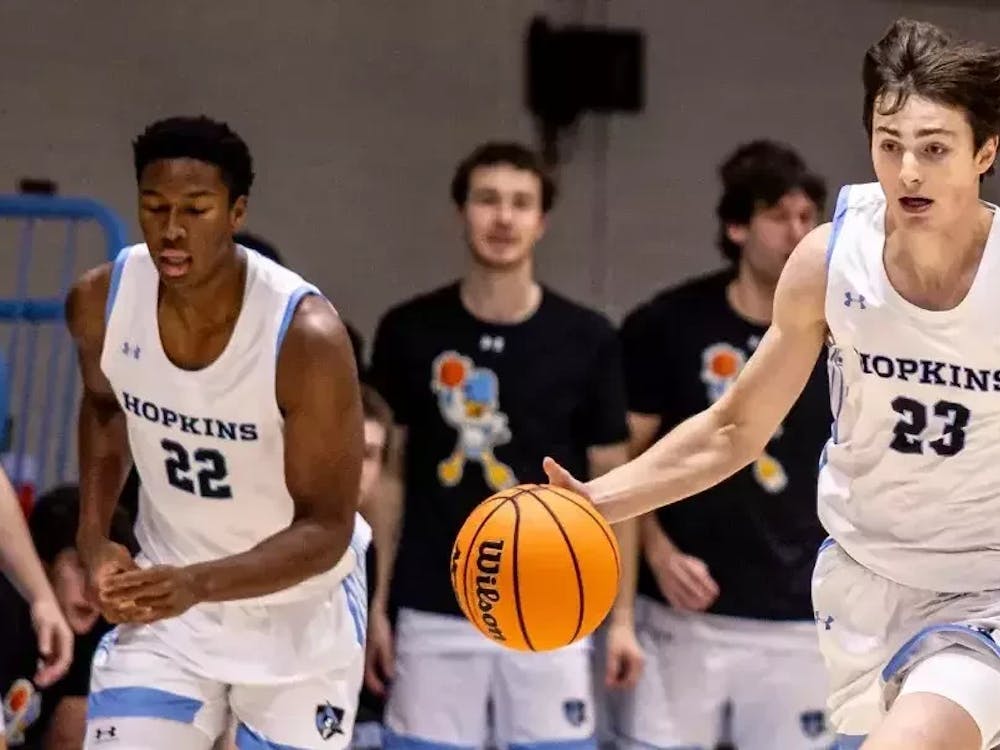GreenHacks hosted the first sustainability hackathon at Hopkins on April 20. The hackathon was held at FastForward U, a collaborative space dedicated to empowering student entrepreneurs across disciplines.
Just minutes away from the Homewood Campus, it was a bright, bustling venue for innovators to come together and discuss sustainability issues that affect the Hopkins campuses.
The theme of GreenHacks can appropriately be described as the unification of disciplines. GreenHacks welcomed students and speakers from the Krieger School of Arts and Sciences, Whiting School of Engineering, the Bloomberg School of Public Health and other Hopkins-affiliated schools. The event attendees included 35 hackers, five staff members, four judges and three presenters.
Junior Thomas Howard, a member of the GreenHacks leadership team, explained how the event came together in just over a month.
It all started when he and Kim Zou, one of Howard’s classmates, were discussing entrepreneurial opportunities in their Sustainable Living class. They both agreed that it would be valuable to hold a hackathon that tackles some of the issues they discussed in class.
But they encountered a problem when they searched for other sustainability hackathons to use as a model.
“We looked online and saw that there wasn’t really a large number of sustainability hackathons, especially when you compare it to the number of technology or computer science focused ones,” Howard said in an interview with The News-Letter.
Luckily a team member had a contact at Harvard University who had successfully orchestrated a hackathon similar to the one that they had in mind.
The GreenHacks team also contacted faculty members and staff in the Office of Sustainability. Two of the mentors are Jason Mathias, the strategic initiative coordinator at the Office of Sustainability and Scot Miller, an assistant professor in the Department of Environmental Health and Engineering.
“We started reaching out to different people and different departments and presenting this idea that we would have an event where we could bring together people from different backgrounds … to accelerate the conversation around sustainability,” Howard said.
In between hacking, several leaders in the field of sustainability spoke to attendees to help them put together their final proposals.
They explained how several college campuses, including Stanford, Harvard and the University of Washington, have attempted to promote sustainable practices.
For example, in an attempt to call attention to waste issues at Harvard’s undergraduate campus, students gathered trash from all the residence halls into a pile at a center point on campus.
Some especially brave students would then conduct “trash audits” and sift through the trash to determine what could have been recycled. This incredibly visual approach was used to inform on-campus residents about the importance of recycling.
Collin Weigel, a Nature Conservancy Postdoctoral Fellow in Behavioral Economics here at Hopkins, also took part in the event. He described the unintended consequences of providing incentives to encourage sustainability.
He gave the example of how the introduction of low flow faucets made it seem like users were reducing their water usage. In reality, those faucets caused a net gain in water usage because the users tended to take more time to wash dishes and take longer showers.
With these tips in mind, hackers had to design presentations in the four and a half hours they were provided.
The projects included inventive ideas for making better use of items discarded on move out days, making energy use data more transparent, building more green spaces for students and engineering sustainable plastics. One of the teams was Blue Jay Boxes. It consisted of freshmen Erika Wong, Maggie Smith, Mitchell Kleckner, Amanda Hinton and Preethi Kaliappan. They presented an idea to implement reusable to go boxes at the Fresh Food Cafe (FFC).
“The blue jay boxes are a system similar to the takeout boxes we have at the FFC, except that instead of being disposable they are reusable.” Wong said in an interview with The News-Letter. “This would reduce our waste and it would also help implement a sustainable state of mind within the Hopkins community.”
Kaliappan also pointed out that while the current boxes are compostable, they don’t always end up in the appropriate receptacles.
“Sometimes if you look into incinerator trash bin there are compostable boxes in there, so this incentivizes students to not direct their trash there,” Kaliappan said.
After each presentation, judges gave feedback on how ideas could be improved or expanded. The winning team, Democratizing Data for Sustainability, proposed a solution to on how to make recycling and energy data more accessible.
Overall the large turnout and well-researched proposals at the event made it a success.




